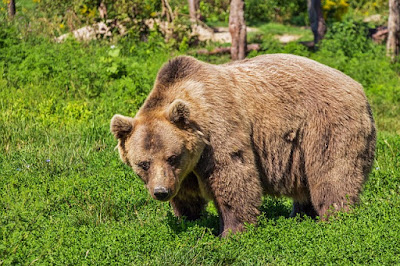In Britain we exterminated our large predators long before other Europeans. The wolverine is estimated to have gone 8,000 years ago, bears 1000 years ago and lynx in 400 AD. The last wolf is reputed to have been shot in Scotland in 1680.
 |
| European brown bear |
In continental Europe large predators survived and in recent years have begun to recover in even the most densely human populated landscapes. Europe (4.3m km2) has more wolves, about 12,000, than the 50 contiguous United States ( 8m km sq.) with 5,500 individuals.The recovery of European brown bear, wolf, lynx and wolverine populations in Europe is a little known and unappreciated story.
Recovery of large carnivores in Europe
Conserving populations of large predators is complex not least because they live at low densities and need large land areas often crossing national boundaries. In N.America black bears and mountain lions still live among low density human populations but brown bears and wolves have largely been confined within protected areas, people and predators are kept apart, the "separation" model.
 |
| Wolverine |
Here in Europe in the last seventy years changing values, culture and legislation to protect large predatory species have resulted in a successful "co-existence" model. Co-existence has led to increased and stable populations of bears, wolves lynx and wolverine. Twenty two countries have brown bears, 23 lynx, 28 wolves and 3 wolverine. The wolverine is limited to Scandinavia by climate and habitat requirements. Wolves have been seen and videoed in the Netherlands, the most densely populated country in Europe.
Wolf in Netherlands video
 |
| Lynx habitat |
Here in the UK our only large predators are eagles but there is a proposal to re-introduce lynx to the W. Highlands where this relatively small large predator could help to control deer numbers which are currently out of control. There is opposition of course from the usual suspects but at least one large estate owner is keen on the idea.
Lynx Trust UK




No comments:
Post a Comment